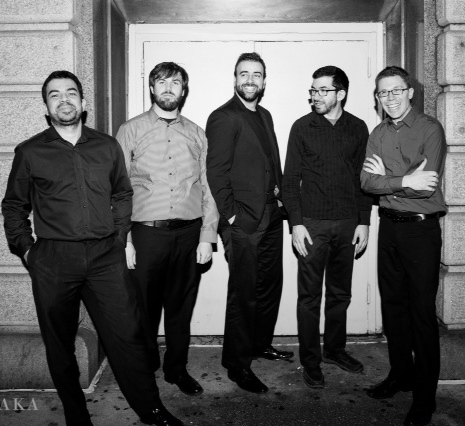Nielsen and Carl works provide the highlights of Iktus new music program
The Iktus percussion ensemble maintains a new music series at the Firehouse Space in Williamsburg, and their latest installment was presented by the American Composers Association Saturday night: works from seven different ACA members.
With seven perspectives and seven wildly different sets of values: the concert was inevitably disjointed, with clashes in not just styles but values. Achievements varied.
Scott L. Miller’s solipsistic, obfuscatory notes for his Jardin Mécanique spun the same idea several times, that of transforming sound through time. As that is an essential feature of all music, one expected something impressive. Yet the music itself was commonplace and with limited ambition.
The percussionists and pianist Julia Den Boer produced various timbres that were amplified and processed through speakers; the shape of the piece outlined a rising curve of activity. Most of the timbres were ordinary, and the free rhythm and structure made it difficult to discern how much Miller composed and how much he left to the musicians to improvise. (This is a single movement from a concert-length work, and in that context the music would likely be entirely different.)
This same mismatch between profound claims and execution hampered Christopher Shultis’ World’s End Preludes, for solo piano. The piece ostensibly outlines the tragic end of a group of Lenape Indians in Colonial Pennsylvania. But the minimal means, usually the juxtaposition of two simple, repetitive ideas or alternations between piano and fortissimo, produced music that was superficially somber while also being diffident, a stance that felt self-regarding without commitment or expression. Den Boer bashed out the loud parts well, but was less than exact in the fast figurations.
The concert’s concluding work, the world premiere of Alice Shields’ Quartet for Piano and Percussion had a better fit of goals and means. The attitude was more playful, and Shields based her structure around Indian dance music. The trills and fast arabesques, and the tick-tock rhythms, were reminiscent of Messiaen, but without the same level of color and verve. What diminished the experience was the stiff performance, with the sense that the musicians were concentrating on counting their way through every bar.
There were more successful works. Voyager by Richard McCandless, suffered in performance. A response to the incredible voyage of the Voyager spacecraft, the piece is counterintuitive; a fanfare followed by a series of marches for solo percussionist accompanied by prerecorded audio. Chris Graham was the soloist, but he initially cut the performance short, due to a malfunctioning monitor. The problem was corrected, but the 15-minute delay dissipated the music’s surprise.
Daniel Tacke’s 3 Canons, heard in its world premiere, had a refreshing modesty and a quiet profile, with Graham and Sean Statser playing tuned instruments. While in canon form, the material is so minimal that the piece is really a set of three echoes with minimal harmony or melody. But the sensitive performance produced a great deal of charm, and the sincerity of the piece made for a strong appeal.
Hearing, and witnessing, Lewis Nielsen’s Lengua Encubierto was a wonderful experience, with a caressing performance by Piero Guimaraes. For speaking (and singing) percussionist, it is built around a poem by Roque Dalton, and uses a whispering dynamic. The piece is mysterious, expressive, and compelling, the overheard stream-of-consciousness murmurings of a man alone in a room. Simmering out of a kind of psychic emptiness, it makes a powerful argument for music as the language of that which is otherwise inexpressible.
Robert Carl’s ColdNightSnow managed the feat of being both abstract and imagistic. Heard in its world premiere, the work was inspired by the long and intense New England winter of 2015. Written for two glockenspiels, the music is simple, tonal, graceful. One was immediately tempted to think of falling snow, but the sound was evocative of the shining clarity of cold winter air, the reflection of lights off bright surfaces, and the sense that there would come a thaw. The music is utterly gorgeous, and left a feeling of mesmerization that lasted as one returned to the night.



